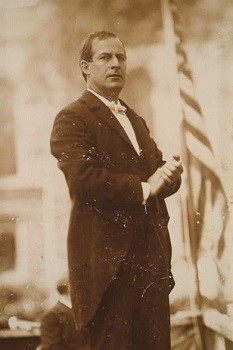

By John Eichlin

Bryan was an important political figure of the era who was many times considered the cornerstone of the Democratic Party. He became very involved in the issues surrounding the Spanish-American War, even joining the Third Nebraska Volunteer Infantry. He is many times criticized for both his views and actions during this time.
Biography:
William Jennings Bryan was born on March 19, 1860 in Salem, Illinois. His parents, Silas and Mariah, were a very religious couple who suffered a great deal over the premature death of two of William's three older siblings. The childhood atmosphere in which he grew up was very religiously and politically oriented. After graduating from Illinois College and Union College of Law, Bryan followed in his father's footsteps by combining the closely related professions of law and politics. He soon became renowned as an excellent orator and took full advantage of this gift.
Bryan's great rise into politics came through his ardent support of bimetallism, which earned him the support of both the Democratic Party and the rural Populist Party. A chief figure among Democrats, he unsuccessfully ran for government positions several times. Generally, as a politician, he considered himself the voice of the common person and a great advocate of individualism.
With the advent of the controversy in Cuba, Bryan remained unusually uninvolved and continued the remain focused upon the issues of silver currency. As the political currents of his contemporaries shifted in favor of a conflict with Spain, he began to ardently campaign for Cuban independence. He argued that America was responsible for spreading the virtues of democracy to such a close neighbor. Waving a small Cuban flag in one hand and a small American one in the other, he excited large crowds in favor of his optimistic ideals.
At the start of the war, Bryan offered his services to his chief political opponent, President McKinley. Before the president assigned him a particular duty, he volunteered as a private in the Nebraska militia, eventually becoming colonel of the Third Nebraska Volunteer Infantry, nicknamed the "Silver Regiment." In July of 1898, his regiment joined the Seventh Corps at Camp Cuba Libre near Jacksonville, Florida. His men saw no active service, but were plagued by typhoid fever and malaria .
Col.William Jennings Bryan (left) with Maj.
Gen.
Fitzhugh Lee, at Camp Cuba Libre.
After the war, Bryan became a staunch supporter of the Anti-Imperialist League and protested the proposal for the U.S. annexation of the Philippines, declaring that his support of the war had been purely in the name of freedom. The colonialism he saw in this act contradicted the very values which the war was supposed to challenge.
To the surprise of his contemporaries, however, he outspokenly approved the ratification of the Treaty of Paris, which provided for the Philippine annexation. He felt the islands had a greater chance of receiving freedom after control had been given to America than if they had remained in Spanish possession. His active support for the treaty may have greatly influenced its narrow ratification. As a result, many of his fellow anti-imperialist politicians criticized his actions, declaring him a traitor to his cause and accusing him of feigning interest against imperialism merely to gain more power for the currency issue, which was most dear to him.
Despite this criticism, Bryan closely counted upon his anti-imperialist stance during the presidential election of 1900. Running for the Democratic and Populist parties against Republican candidate William McKinley, he believed that the course of American foreign policy would be the decisive issue of the campaign. Unfortunately, McKinley beat Bryan by a larger margin than he had in 1896. In truth, the campaign was not as based upon imperialism as he had believed. The main issues in many of the voters' minds were in fact domestic issues, such as economic policy.
Bryan declared his anti-imperialistic views a result of his sense of social justice. Quoting role model Thomas Jefferson, he declared in a famous campaign speech in Indiana, " ' I know but one code of morality for men, whether acting singly or collectively ' " (Ginger 63). Colonial governments represented exploitation and organized robbery.
A racist perspective also influenced his point of view. In a quest to keep the American population homogenous, he feared the annexation of the Pacific islands would bring dissension and confusion to American politics. His contemporaries argued, since they felt the islanders so inferior, the groups needed American guidance and protection.
In 1925, Bryan, at age 65, became prominent again as a prosecutor in the Scopes trial, which determined whether or not evolution should be allowed to be taught in American public schools. With the end of the trial, Bryan was exhausted and soon became very sick. He died on July 26, 1925.
(As a service to our readers, clicking on title in red will take you to that book on Amazon.com)
Ashby, Le Roy, "William Jennings Bryan". Twayne's Twentieth Century American Biography Series. (Boston: Twayne P, 1987).
"Bryan, William Jennings." Encyclopedia Britannica. 14 ed. 1929.
Cohen, Stan. Images of Spanish American War, April-August,1998. (Missoula:Pictorial Histories Publishing Co., Inc., 1997) 81.
Ginger, Ray, ed. "William Jennings Bryan: Selections". The American Heritage Series (Indianapolis: Bobbs - Merrill, 1967).
Koenig, Louis W., Bryan: A Political Biography of William Jennings Bryan. (New York: G. P. Putnam's Sons, 1971).
Norton, Mary Beth, et al., A People and a Nation. 4th ed. (Boston: Houghton Mifflin Co, 1994).